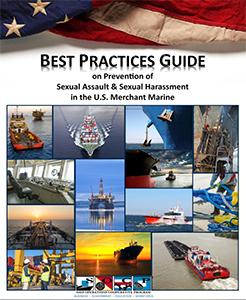The Ship Operations Cooperative Program (SOCP), a nonprofit organization of maritime industry professionals, has published its first issue of Best Practices Guide on Prevention of Sexual Assault & Sexual Harassment in the U.S. Merchant Marine. The compilation is based on work supported by the Maritime Administration (MarAd) and has an intended audience of virtually every member and segment of the industry.
The guidelines are designed to provide companies with a core model for efficient and effective sexual assault and sexual harassment (SASH) policy, or to augment existing protocol. The 79-page publication identifies a wide range of unacceptable behavior for merchant mariners and spells out specific prevention-and-response measures for federal and commercial maritime entities, academies and other training facilities.
The guide, structured to address personnel and companies separately, offers maritime employees “guidance on their responsibility to be respectful and actively participate in a work environment free of sexual assault (and) sexual harassment.” The employee section defines a range of inappropriate behavior including hazing, bullying, stalking, acts of retaliation and coercion. It outlines effective methods for responding to an incident and covers many essential elements of safety and victim advocacy.
For maritime companies, the guide delivers a blueprint for preventing and responding to SASH incidents. It recommends the companywide adoption of the six best practices that comprise the plan:
- Provide employees with definitive definitions of what constitutes prohibited behavior — as well as such actions that may be punishable by law — whether in port, on shore or at sea.
- Promote a positive company culture free of interpersonal improprieties and intimidation.
- Develop mandatory standards and policies for problem prevention for all hands.
- Provide appropriate and ongoing training for all personnel.
- Provide employees with several safe and effective options for reporting incidents, avenues that are free of unwarranted repercussions.
- Implement easy-to-follow policies and procedures on how to respond to and resolve incidents.
Scott David Carter, captain of Pacific Provider, a newly registered U.S.-flag luxury expedition vessel owned and operated by Offshore Outpost, said he welcomes the guide and intends to put the contents to work.
“(It) could not have come out at a better time for us,” Carter said. “I’m actually working with management and shoreside operations to strengthen company policies, and the information will come in handy.”
The SOCP suggested “wide circulation” of the guide beyond professional merchant mariners and maritime companies.
“Other segments of the U.S. maritime industry such as vessel marine agents, pilots, marine terminal personnel, longshoremen, personnel working in U.S. ports, shipbuilding and ship repair industry personnel, and contractors, subcontractors and vendors interacting with merchant mariners should all be made aware of these best practices,” the guide states.
The SOCP urged all sectors of the maritime industry to “continue the dialogue and spread the word about the importance” of finding effective solutions to SASH issues, and said that a consolidated industrywide effort “will allow (the maritime community) to continually improve and revise these best practices.”
The guide can be downloaded by visiting www.socp.us and clicking on the “Products” label.

